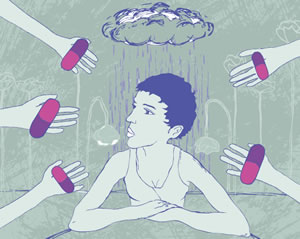In this article, we’ll discuss what pathologizing (pathologize) is, the different types of pathologizing, the symptoms of pathologizing, and the causes of pathologizing. We’ll also provide some self-help tips and resources for those who need them.
Contents
Understanding Pathologizing

Pathologizing is the act of labeling someone or something as being diseased or abnormal. It can be a very harmful thing to do. And it’s important to know how to deal with it if you find yourself in a situation where you face pathologization.
How Common Is Pathologizing
Pathologizing is a very common occurrence, and it can happen to anyone at any time. So, it’s important to be aware of the risk factors associated with pathologizing. And more importantly to know how to cope with it if it happens to you.
Stigma Vs. Pathologizing
It’s important to be able to differentiate between stigma and pathologizing.
- Stigma is when someone faces judgment or criticism because of their mental health problem.
- Pathologizing, on the other hand, is when someone is labeled as being diseased or abnormal.
Mental health awareness is on the rise, and more people than ever before are talking about mental health issues. However, there are still a lot of stigmas attached to mental health problems, and many people find themselves pathologized because of them.
Types of Pathologizing
There are three primary types of pathologizing: physical, psychological, and social.
Physical Pathologizing: Physical pathologizing is when someone is labeled as being diseased or abnormal based on their physical appearance or body shape. This type of pathologizing is often done to people who are considered to be overweight or obese, and it can be very harmful to their mental health.
- Example: “You’re so fat, you must be diseased.”
Psychological Pathologizing: Psychological pathologizing is when someone is labeled as being diseased or abnormal based on their mental state or behavior. This type of pathologizing can be very damaging to a person’s self-esteem and can lead to feelings of shame and isolation.
- Example: “You’re crazy, there’s something wrong with you.”
Social Pathologizing: Social pathologizing is when someone is labeled as being diseased or abnormal based on their social status or lifestyle. This type of pathologizing can be very harmful to a person’s relationships and can lead to feelings of isolation and exclusion.
- Example: “You’re a weirdo, no one wants to be around you.”
Risk Factors of Pathologizing
Several risk factors can increase a person’s chances of being pathologized. Some of the most common risk factors include:
- Feeling like you’re under pressure to be thin or perfect
- Having a mental health disorder such as anxiety or depression
- Hearing negative comments about your appearance or body shape
- Experiencing discrimination or bullying because of your weight or appearance
Contemplating Ill-effects of Pathologizing

Pathologizing someone is a very serious thing to do, and it can have several harmful consequences for the person who is being pathologized. Some of the ill effects of pathologizing include:
- Mental Ill-effects: Pathologizing can lead to a person feeling ashamed, embarrassed, and isolated. It can also cause them to suffer from mental health problems such as anxiety and depression.
- Emotional Ill-effects: Pathologizing can also lead to a person feeling angry, resentful, and frustrated. It can also cause them to experience sadness and grief.
- Physical Ill-effects: Pathologizing can lead to a person being bullied or harassed because of their appearance or weight. It can also cause them to experience physical health problems such as heart disease and diabetes.
- Social Ill-effects: Pathologizing can lead to a person having difficulty forming relationships and feeling excluded from social activities. It can also cause them to experience discrimination and harassment.
Coping With Pathologizing
If you find yourself in a situation where you are facing pathologizing, there are several things that you can do to cope. Some of the most effective coping strategies include:
- Self-help Tips: Several self-help tips can help you deal with pathologizing, including staying positive, building your self-esteem, and reaching out for support.
- Self-help Tools: Several self-help tools can help you deal with pathologizing, including positive affirmations, visualization and relaxation exercises, and journaling.
- Support Groups: There are several support groups available for people who constantly go through pathologizing. These groups can offer you support and advice and can help you to cope with the experience.
How To Stay Positive
When you constantly face pathologizing, it can be difficult to stay positive. However, it is important to remember that you are not alone and there are several things that you can do to stay positive. Some of the most effective ways to stay positive include:
- Seeking professional help
- Practicing self-compassion
- Spending time outdoors in nature
- Engaging in activities that you enjoy
- Staying connected with friends and family
How To Build Self-esteem
When you face pathologizing, it is important to have a strong sense of self-esteem. This will help you to cope with the experience and to maintain your positive attitude. There are several ways that you can build your self-esteem, including:
- Building healthy relationships
- Setting goals and achieving them
- Accepting yourself for who you are
- Giving yourself credit for your accomplishments
Talking To a Professional
If you are struggling with pathologizing, it can be helpful to talk to a professional. This will allow you to get the help that you need and will ensure that you receive the best possible care.
Moreover, several different therapies can help you address and cope with your condition. However, some of the most common treatments for pathologizing include:
- Therapy: Therapy is a great way to deal with any mental health issues that may be contributing to your pathologizing. Since it can help you learn more about yourself and your condition. Furthermore, it can provide you with tools and techniques for managing your symptoms.
- Medication: If you are struggling with severe symptoms, your doctor may prescribe medication to help you manage them. As medications can be very helpful in managing pathologizing. But it’s important to work with your doctor to find the right medication and dosage for you.
Hearing From Experts

If you would like to learn more about pathologizing, we are going to quote an expert who could provide us with more information.
Dr. Elizabeth Lee is a clinical psychologist who specializes in the treatment of eating disorders and body image concerns. She provided us with some insight into physical pathologizing and how it can be harmful to someone’s mental health.
“Physical pathologizing is a very harmful and damaging thing to do to someone. Since it can lead to feelings of self-doubt, shame, and isolation. And it can also be a trigger for mental health problems such as anxiety or depression.”
Case Study
To provide further insight into pathologizing, we spoke to Sarah, a woman who has experience with it.
“I was pathologized for being overweight when I was younger. And I felt like I wasn’t good enough and that I was diseased because of my weight. Moreover, it was damaging to my self-esteem. And it took a long time to recover from the damage that it did.”
“So, if you’re experiencing pathologizing, my advice would be to find a support group or talk to someone who understands what you’re going through. Because it can be really helpful to have someone to talk to who understands what you’re going through.”
Resources
If you would like more information on pathologizing, here are some resources that might help:
- “The Binge Eating Disorder Workbook: How to Stop Overeating and Lose Weight Permanently” by Carolyn Costin
- “Pathologizing Fat: From Bad Science to Social Control” by Marilyn Wann
Conclusion
Pathologizing can be a very damaging experience. But it is important to remember that you are not alone. Moreover, there are several resources available to help you cope with pathologizing and get the help that you need. Remember to be kind to yourself!! And don’t hesitate to reach out for help if you need it.
A Word From Therapy Mantra
Your mental health — Your psychological, emotional, and social well-being — has an impact on every aspect of your life. Positive mental health essentially allows you to effectively deal with life’s everyday challenges.
At TherapyMantra, we have a team of therapists who provide affordable online therapy to assist you with issues such as depression, anxiety, stress, workplace Issues, addiction, relationship, OCD, LGBTQ, and PTSD. You can book a free therapy or download our free Android or iOS app.


